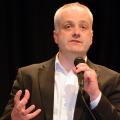
A STORY in last week’s Alloa Advertiser caught my eye.
The Braveheart Association charity have set up short, weekly walks lasting just half an hour designed for people who would like start exploring the outdoors but aren’t necessarily ready for longer more intensive routes.
The walks are open to everyone, free, and followed by a cup of tea. The organisers also provide support for people living with long term conditions and dementia.
I was struck by how this seemingly simple idea has such enormous potential to improve people’s lives. The first walk has already taken place and went from Bowmar to the Black Devon Wetlands and a new walk is scheduled for today starting at the Community Healthcare Centre.
The benefits of exercise and spending time outdoors for your mental and physical health are well known. Recently I was lucky enough to be given a tour of a SAMH service which uses gardening to help people recover from mental health issues and the impact that spending time outdoors with nature was clear.
But lots of people face barriers to spending time outside. That’s why Braveheart providing a friendly, supportive and welcoming environment to those wishing to spend time outdoors is so important.
But while Braveheart’s efforts are to be applauded, when it comes to ensuring people are encouraged and able to spend time outdoors the entire burden can’t be carried by the charity sector.
Local authorities and the Scottish Government have to take responsibility and ensure that our outdoor environments, both urban and rural, are clean, pleasant and accessible.
Part of that involves ending the supremacy of cars on our streets. Not only is a reduction in car usage a vital part of our response to the climate emergency, but it would also make streets safer for walkers and cyclists while slashing air pollution at the same time.
Unfortunately, at the moment, the Scottish Government spends only around 2 per cent of its transport budget on active travel. Meanwhile expansion of the road network continues apace, including a staggering £3billion spent on dualling the A9.
There are also significant problems with data gathering. While there is a huge amount of information on traffic flow can car numbers, there is very little available on numbers of pedestrians.
Meanwhile, the quality of parks and greenspaces continues to deteriorate, depriving people of much needed opportunities to relax and enjoy the outdoors.
If public spaces are to be truly accessible for people on foot or on bikes then radically increase our focus and investment in active travel.
Much is made of potholes and the poor conditions of roads, which is of course hazardous, but far less attention is paid to poorly maintained pavements, footpaths and walkways.
These present enormous hazards to pedestrians, particularly older people, but aren’t taken as seriously as issues with roads.
The outdoors belong to all of us, efforts to make them more accessible and welcoming to everyone will have my support.
But there must be a significant shift in government thinking when it comes to how we make that a reality.



Comments: Our rules
We want our comments to be a lively and valuable part of our community - a place where readers can debate and engage with the most important local issues. The ability to comment on our stories is a privilege, not a right, however, and that privilege may be withdrawn if it is abused or misused.
Please report any comments that break our rules.
Read the rules here